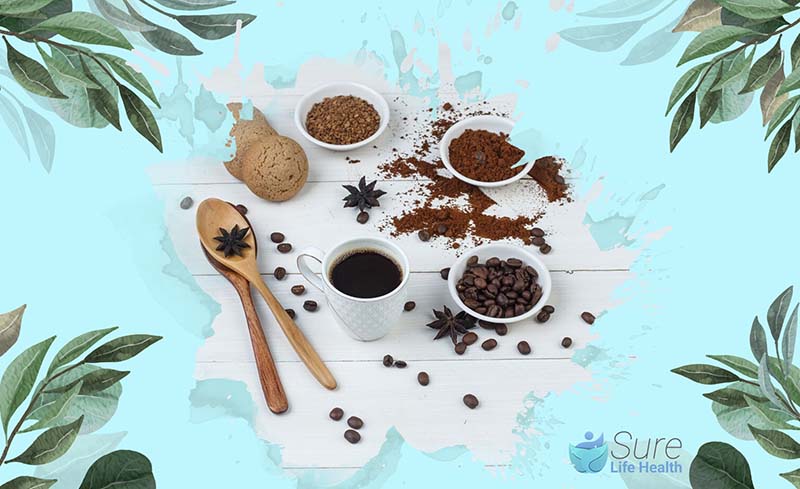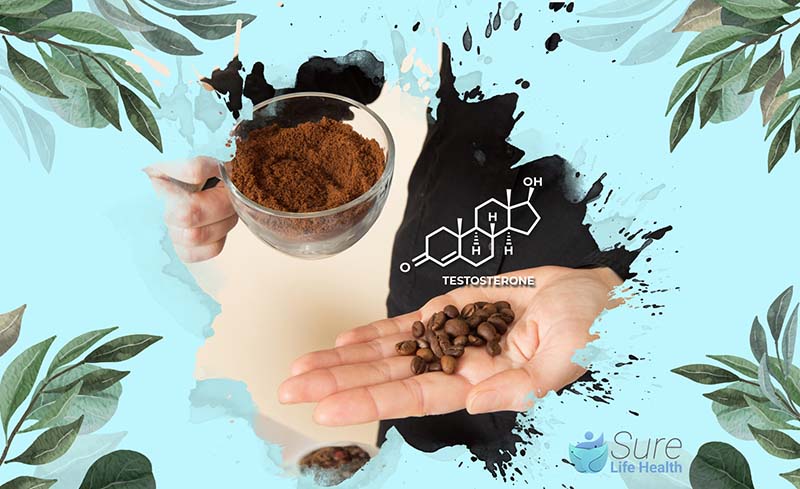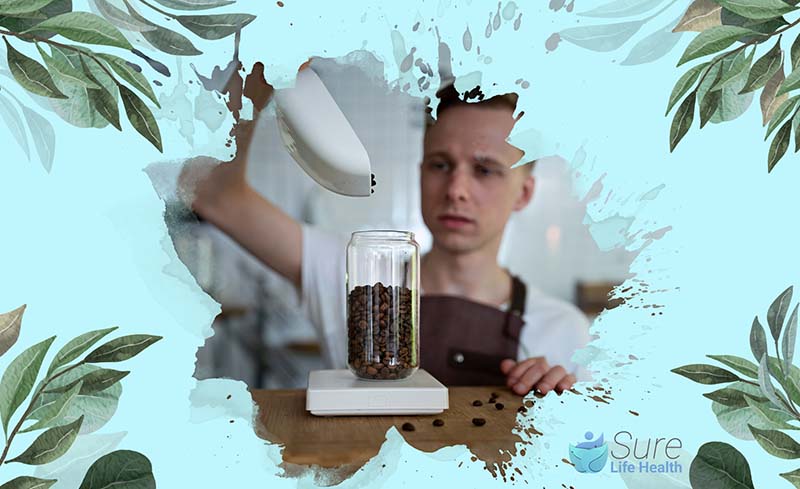Many people are curious about the impact of coffee on testosterone levels, often asking, “Is Coffee Bad for Testosterone?” Known for its energizing properties in moderation, coffee is a beloved beverage worldwide. It’s essential to note that coffee’s effects on testosterone can differ depending on its composition.
In this guide, we will explore the relationship between coffee and testosterone. We’ll discuss how coffee can influence your testosterone levels and overall health, what’s actually in coffee, how much is safe to drink, any studies looking into the question of “Is Coffee Bad for Testosterone?”, and more.
Is Coffee Bad for Testosterone?
Coffee’s impact on testosterone levels isn’t straightforward. Certain studies propose that caffeine, a primary ingredient in coffee, could boost testosterone levels in men with regular consumption.
However, it’s crucial to acknowledge that the link between coffee and testosterone isn’t clear-cut due to conflicting findings in research. Some studies even suggest that excessive caffeine intake might be linked to decreased testosterone levels in men.
Consequently, while coffee might offer potential benefits for testosterone production, it’s not a surefire remedy for testosterone deficiencies. Seeking guidance from a healthcare provider for tailored advice on managing testosterone levels is recommended.

Coffee Nutrition Table
Consider the nutritional profile of a 240g cup of brewed black coffee without added cream or sugar:
- Calories: 2.4
- Fat: 0g
- Sodium: 4.8mg
- Carbohydrates: 0g
- Fiber: 0g
- Sugars: 0g
- Protein: 0.3g
- Potassium: 118mg
- Magnesium: 7.2mg
- Carbohydrates: Plain black coffee contains zero carbs.
- Fats: Black coffee has no fats unless you add milk or other saturated fats like in bulletproof coffee.
- Protein: There’s a minimal amount of protein in black coffee. Adding milk or alternatives can increase the protein content.
- Vitamins and Minerals: Plain coffee contains small amounts of micronutrients such as potassium, magnesium, phosphorus, manganese, folate, choline, and sodium.
- Calories: A plain black coffee serving has 2.4 calories, mainly from protein.
When you start adding milk, flavorings, syrups, sugar, and whipped cream, a coffee drink can turn into a calorie-rich dessert. For instance, a 16-ounce Starbucks Java Chip Frappuccino contains 440 calories, 12 grams of saturated fat, and 63 grams of net carbs.

How Does Caffeine Affect Testosterone?
While many enjoy coffee for its energizing effects, it may also positively influence testosterone production in men. Research indicates that regular coffee drinkers tend to have higher testosterone levels compared to non-coffee drinkers. However, this effect is short-lived. While coffee can temporarily boost testosterone levels shortly after consumption, it’s not a sustainable solution for addressing long-term testosterone deficiencies.
Low testosterone levels can stem from various underlying factors, so it’s advisable to seek professional guidance for proper treatment.
Many supplements designed to enhance testosterone levels incorporate coffee or caffeine as active ingredients, alongside other compounds. These supplements aim to improve various bodily processes directly or indirectly linked to testosterone synthesis. However, it’s important to note that supplement manufacturers often emphasize that optimal results are achieved when supplementation is combined with an active lifestyle and a balanced diet regimen.

Disadvantages of Using Caffeine
The impact of caffeine on the body varies significantly, influenced by dosage, personal tolerance, and usage frequency.
Here are some potential disadvantages to consider:
Caffeine Disrupts the Sleep Cycle
Caffeine can interfere with sleep by blocking adenosine receptors, delaying the onset of drowsiness, and reducing overall sleep quality.
This may result in changes to sleep stages and a decrease in total sleep time.
Caffeine Can Cause Digestive Disorders
Caffeine can stimulate acid production in the stomach, leading to gastrointestinal discomfort such as acid reflux or GERD.
It may also accelerate digestion, causing diarrhea or increased bowel movements in certain individuals.
Caffeine Can Produce and Worsen HPA Axis Dysfunction
Excessive caffeine intake can activate the Hypothalamic-Pituitary-Adrenal (HPA) axis, potentially increasing cortisol production and exacerbating stress-related symptoms.
Chronic stimulation of the HPA axis by caffeine or other stressors may contribute to HPA axis dysfunction over time.
Caffeine Inhibits Thyroid Function
Research on caffeine’s effect on thyroid function yields mixed results.
While some studies suggest that high caffeine consumption could disrupt thyroid hormone production or action, conclusive evidence is lacking. Further research is needed to elucidate this relationship.
Caffeine Can Worsen Anxiety
Caffeine’s stimulatory effects on the nervous system can intensify symptoms of anxiety disorders, increasing heart rate, blood pressure, and feelings of jitteriness or nervousness.
Caffeine May Contribute to Chronic Fatigue Syndrome
While caffeine itself doesn’t directly cause CFS, its impact on sleep and the stress system may exacerbate fatigue in susceptible individuals.
Excessive caffeine use, particularly in those with CFS, could worsen symptoms by disrupting sleep patterns and perpetuating a cycle of energy reliance followed by crashes and increased fatigue.
Impact of Caffeine on Additional Hormones
Caffeine is a dynamic substance that not only affects testosterone but also influences several other hormones:
- Cortisol: Known as the ‘stress hormone,’ cortisol plays a role in responding to stress, elevating blood glucose levels for brain function, boosting energy levels, and aiding tissue repair while reducing inflammation. Research indicates that caffeine, whether from coffee or other sources, can interact with cortisol and increase its levels. While this can be beneficial in many cases, maintaining a balance in cortisol levels is crucial, as both over- and under-secretion can negatively impact bodily processes.
- Adrenaline: As a ‘fight or flight’ neurotransmitter, adrenaline helps the body respond to stressful situations by providing short bursts of energy. Coffee consumption supports this process by raising blood pressure and enhancing energy levels, preparing the body to cope with stress.
- Serotonin and Dopamine: Serotonin and dopamine are hormones responsible for mood elevation and providing a sense of well-being. Research suggests that coffee or caffeine intake can interact with these neurotransmitters, triggering serotonin release and prolonging dopamine’s presence in the brain, enhancing its effects.
- Estrogen: Some studies indicate that moderate coffee consumption may increase estrogen levels in women in certain cases. However, further research is required to fully understand the specific response of estrogen to caffeine exposure.
How Much Coffee Is Enough?
Coffee contains a notable amount of caffeine, and excessive intake can lead to various issues. Therefore, practicing controlled consumption allows you to enjoy the benefits of coffee without negatively impacting bodily functions.
According to the European Food Safety Authority (EFSA), consuming up to 400 mg of coffee per day is generally considered safe for healthy adults who regularly drink coffee. Pregnant and lactating women are advised to limit their coffee intake to 200 mg per day for safety. While healthy adults may consume more than this, exceeding these limits could potentially affect hormone levels in the body.
It’s important to recognize that coffee can affect individuals differently. Regular coffee drinkers may tolerate moderate caffeine intake better than occasional drinkers, who may experience more pronounced effects. Additionally, it’s advisable to avoid consuming coffee before bedtime to prevent disruption of sleep patterns.

Conclusion
To sum it up, addressing the question, “Is coffee bad for testosterone?”—a moderate amount of coffee might actually support testosterone levels, offering a beneficial twist to your daily brew.
Keep consumption balanced, and not only can you enjoy the energy boost, but also potentially a slight hormonal boost. Remember, moderation is crucial to enjoy these benefits without adverse effects.
Be sure to explore more insightful blogs from Sure Life Health, where we continue to shed light on the latest trends and breakthroughs in health and wellness.
Professor Gaye Cunnane, PhD, MB, FRCPI
As the Director of Health and Wellbeing at RCPI, Professor Gaye Cunnane is at the helm of initiatives aimed at enhancing the health and well-being of RCPI Trainers and Trainees. Her role extends beyond administration; she is also a respected clinical professor of rheumatology and a consultant rheumatologist at Trinity College Dublin (TCD) and St James’s Hospital. Prof. Cunnane’s medical journey began at TCD, where she graduated from medical school, and her path has been marked by both clinical and academic excellence.
After completing her basic clinical training in medicine, she embarked on PhD studies at University College Dublin and St Vincent’s University Hospital. Her research during this period was focused on prognostic markers in early inflammatory arthritis, a project that saw her collaborating with esteemed universities across Europe, including in Switzerland, The Netherlands, the UK, and Sweden.
Prof. Cunnane’s career took her to the University of California, San Francisco, where she spent three years delving into research on new treatments for lupus. Her academic prowess led her to the University of Leeds in 2001 as a senior lecturer, before returning to Ireland in 2003 to assume her current roles. She has also served as the National Specialty Director for Rheumatology training in Ireland, Programme Director for Basic Specialist Training with RCPI, and as a past President of the Irish Society for Rheumatology.
PUBLISHED ARTICLES
“Rheumatic disease differentiation using immunoglobulin G sugar printing by high-density electrophoresis”: Published in The Journal of Rheumatology, this study reflects her in-depth investigation into rheumatic diseases.
“Benefits of exercise in patients with rheumatoid arthritis: a randomized controlled trial”: This research work, highlighting the positive impact of exercise on rheumatoid arthritis, underscores Prof. Cunnane’s dedication to practical, patient-centered research.
Additionally, Prof. Cunnane has made notable contributions to the Annals of the Rheumatic Diseases, discussing early referral, diagnosis, and treatment of rheumatoid arthritis. She has also been involved in a study on the NCBI platform investigating exercise benefits in rheumatoid arthritis patients.
Professor Gaye Cunnane’s career is a testament to her commitment to improving patient outcomes in rheumatology through rigorous research, clinical excellence, and dedicated teaching. Her work continues to influence the field of rheumatology, both in Ireland and internationally.

